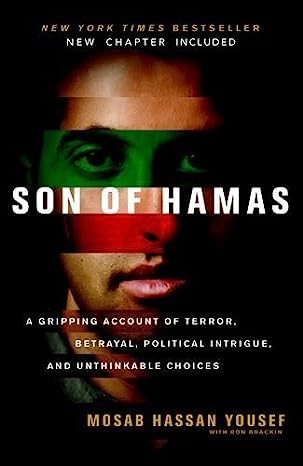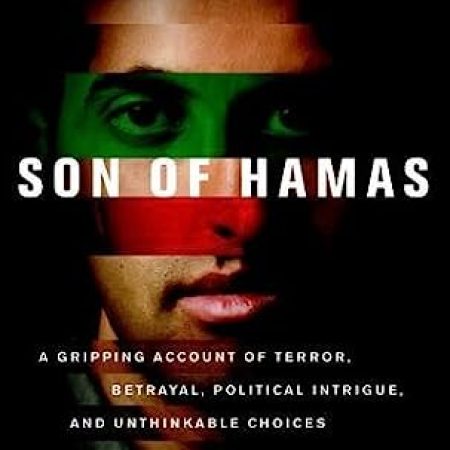
I am nervous about dramatic autobiographical accounts of recently converted people. I am somewhat suspicious about their motivation and concerned about their spiritual vulnerability in becoming so prominent and high-profile at such an early stage in the spiritual journey. Of course, time will tell as far as Son of Hamas is concerned, but I put the book down, after reading it through in one sitting, marvelling at the saving and keeping grace of God who had been and is at work in some of the most unlikely places and people.
Mosab Hassan Yousef is the son of one of the founders of the Islamic Resistance Movement, Hamas, and spend much of his youth accompanying his father as he spoke at public meetings and dialogued with some of the leading players in the Middle East turmoil of the 80s and 90s. He begins with a very helpful background to and overview of political developments in Israel and between Israel and Palestine, and there is a time line at the end of the book along with a useful `cast list’ and a glossary of some of the terms and words. He was devoted to his father, a devout and faithful Iman, who, while never espousing the trademark violence and terrorism of Hamas, never did what he could to stop it. Yousef is critical of him while also, as a loyal son, protecting his life on numerous occasions, even when it involves getting him sent to prison for his own protection. As a youngster Yousef is arrested and brutally tortured by the Israelis and as a result agrees to become a double agent for Shin Bet, the Israeli secret service, though initially he is motivated by the possibilities that would afford him to turn on his handlers and kill them in revenge for what he and his people had suffered. Gradually he discovers that life is not a simple distinction between the good guys and the bad guys; that Hamas is not all that he had believed and neither are the Israelis. His is increasingly disillusioned by the deceit and violence of his own people though not uncritical of the Israelis either.
Early on in his new and very dangerous double life he is met by some unnamed Christians who, unaware of who he is, invite him to a Bible study, share the Scriptures with him and Yousef begins to see that Christianity and Christ were not what he had been brought up to believe either. Gradually his values and attitudes change, affecting the way he interacts with both Jews and Arabs, and he comes to a point of conversion and is subsequently quietly baptised; itself a step of immense courage as well as of obedience.
Eventually, Yousef leaves the employ of Shin Beth and settles in the States but not before he is personally caught up in and witness to some of the most dramatic and harrowing scenes you could imagine. Yousef realises that the greatest enemy faced by both Arab and Jew is not the other, and that there is ultimately no political solution to the Middle East crisis, only a Gospel one.
For me, the highlights of the book are the four key players, at least from a human perspective. Yousef himself is, of course, at the centre of the story, but he has an honest view of himself at all stages of his journey and is adamant, even as his Christian story becomes a focus of world-wide attention, that he is no-one special, just someone in a spiritually privileged and opportune position to influence things for good and for God. His father, Sheikh Hassan Yousef, is a character you can’t help but respect and admire despite his weaknesses. He is profoundly loyal to his faith and the bond between father and son is truly heart warming. Even when he hears in prison of his son’s conversion, he refuses to disown him and when he gets a chance to speak to Yousef on the phone affirms him as his son. Sadly, the day before this book was published, Sheikh Hassan publicly disowned Yousef.
The third main player is the Israeli agent, known for most of the book as Loai but later revealed as Gonen ben Itzhak. These two men, from polar opposites of the political and religious scale become the very closest of friends and their mutual respect and affection is deeply moving. Quite remarkably, for the work Yousef, a militant Palestinian, did for the Israelis, the Israeli Knesset Foreign Affairs and Defense Committee wrote him a letter of gratitude, perhaps the first of its kind in Israeli history.
The fourth key player is unnamed in the book but is the faithful believer who first made contact with the young Arab and who, along with others, befriended, counselled and mentored Yousef as he grew into his Christian faith. It’s a reminder that God has his faithful people serving as salt and light and not afraid to open their mouths even in the most hostile of environments.
This is an immensely powerful and moving book. It is a genuine `page turner’ and I was grateful that I had a `free’ evening when I could immerse myself in it. It has to be said that some of the accounts of torture and suffering are harrowing but are in now way gratuitous or graphic. They are the harsh reality of the events recounted.
I can’t commend this book highly enough and now that it is available as a free download in Arabic, we ought to pray that it will be singularly used of God to soften and win the hearts of many. I sense, given my opening comments, that we ought also to be much in prayer for Yousef himself, that he would be protected, both spiritually and physically, and be of great usefulness to his new `handler’, the sovereign God.
Authentic Media (13 May 2011) Review written in 2011
